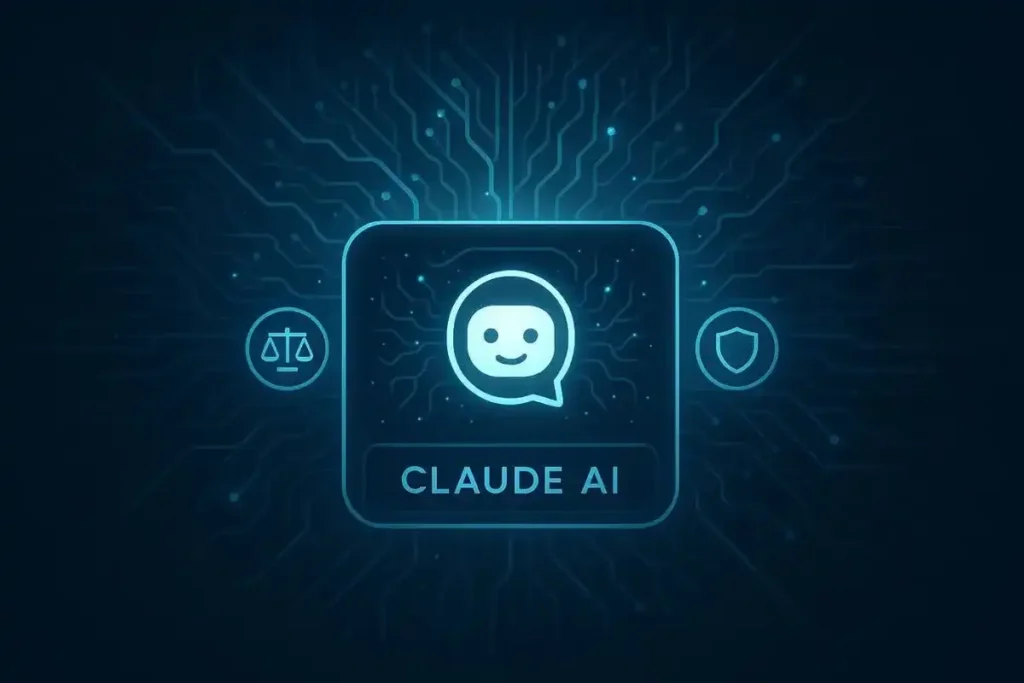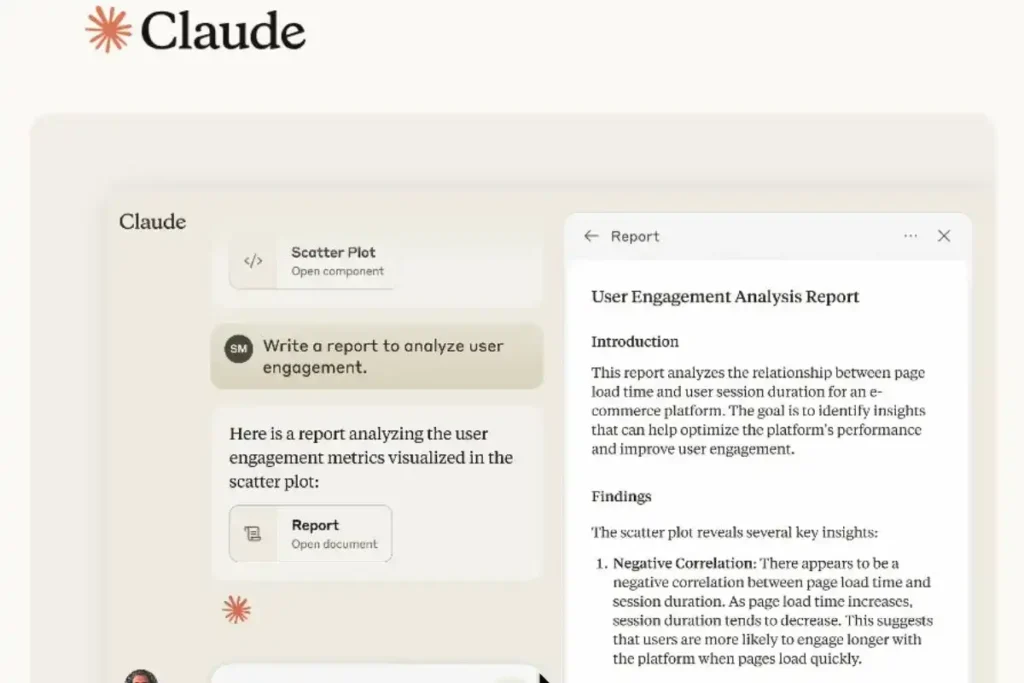
Have you ever imagined having a digital assistant that feels more like a trusted partner than a machine? One that understands your questions, respects your privacy, and responds in a way that feels natural and helpful? That’s where Claude AI enters the scene. Developed by Anthropic, this cutting-edge AI model is designed to bridge the gap between powerful machine learning and ethical, human-centered interaction.
Related: DeepSeek: Revolutionizing AI with Powerful Language Models
Whether you’re a student, entrepreneur, developer, or just curious about the future of artificial intelligence, Claude by Anthropic is worth your attention. In this article, we’ll explore what Claude is, how it works, what sets it apart, and how you can use it in real life.
What Is Claude AI and Who Created It?
What is Claude AI?
Anthropic, an AI safety and research company based in San Francisco, developed Claude AI as a conversational artificial intelligence. Inspired by Claude Shannon—the father of information theory—Anthropic designed Claude AI to deliver helpful, honest, and harmless responses.
Certainly! Here’s the revised version with transition words added for improved flow:
Unlike traditional AI tools that focus purely on performance, Claude by Anthropic, on the other hand, emphasizes safety and ethical interactions. In addition to its core functions, it can write essays, summarize documents, answer complex questions, and even offer creative writing support—all while remaining mindful of tone and context.
Who Founded Claude?
Claude AI serves as Anthropic’s flagship product. Dario Amodei and a team of former OpenAI researchers founded the company in 2021. The team behind Anthropic believed in the need for a more interpretable and steerable form of AI. Their goal? Build an AI assistant that not only performs tasks well but also aligns with human values.
Anthropic’s founders have deep roots in AI safety research. Their approach, known as “Constitutional AI,” trains models using a set of ethical principles designed to guide responses in a safe and transparent manner.
Why Claude AI Stands Out
While many AI models offer similar capabilities, Claude distinguishes itself in several important ways:
- It is designed with a strong emphasis on safety and alignment.
- It avoids generating harmful or biased content by using ethical training techniques.
- It supports extended conversations and maintains context better than many competitors.
For example, a teacher using Claude to create classroom content can expect consistent, respectful tone and factually grounded suggestions—minimizing the risk of misinformation.
How Does Claude AI Work?

Related: AlphaEvolve: The Future of Self-Evolving AI by Google
Claude’s Architecture Explained
At its core, Claude is built on large language models (LLMs), which are trained on massive datasets to understand and generate human language. Claude leverages deep learning techniques to read, analyze, and respond to queries much like ChatGPT or Google’s Gemini.
However, Claude is different in how it prioritizes ethics and user alignment. Its neural network is guided by specific values outlined in its training, reducing the chances of generating unsafe or misleading content.
What is Constitutional AI?
One key feature that sets Claude apart is its use of Constitutional AI. Rather than relying solely on reinforcement learning from human feedback (RLHF), Claude is trained with a built-in set of ethical rules—or a “constitution.” This helps guide its responses in a way that prioritizes honesty, privacy, and user wellbeing.
For instance, if a user asks a potentially harmful question, Claude is more likely to respond with a respectful refusal and offer safe, constructive alternatives.
Workflow Example of Claude
Here’s a simple look at how Claude by Anthropic processes a request:
- Input: A user asks a question or provides a task.
- Processing: Claude references its training and ethical guidelines.
- Response Generation: It formulates a clear, helpful, and safe reply.
This process ensures that the AI remains consistent and responsible, even during extended or sensitive interactions.
Comparison Table: Claude AI vs GPT-4
| Feature | Claude AI | GPT-4 |
|---|---|---|
| Developer | Anthropic | OpenAI |
| Focus | Ethics & Safety | Versatility |
| Privacy | High | Moderate |
| Language Accuracy | Very High | High |
| Ethical Guardrails | Yes (Constitutional AI) | Partial (RLHF) |
Top Features and Use Cases of Claude AI
Key Features of Claude by Anthropic
Claude by Anthropic comes with a wide range of powerful features:
- Maintains long conversational context
- Generates content with a clear, consistent tone
- Performs complex reasoning tasks
- Adapts to user feedback and preferences
In practical terms, this means Claude can help you draft emails, write blog posts, analyze reports, or brainstorm ideas with ease.
Claude AI for Businesses
Businesses across industries are adopting Claude to improve efficiency and customer experience. Some common use cases include:
- Customer Support Chatbots: Answering FAQs and resolving queries without human intervention.
- Internal Knowledge Assistants: Helping employees find information quickly.
- Content Generation: Writing reports, emails, or marketing content.
A startup founder, for example, could use Claude to automate onboarding emails or generate user documentation, saving valuable time and resources.
API & Integration
Claude by Anthropic provides an API that allows developers to integrate its capabilities into their applications or platforms. It can be plugged into popular tools like Notion, Slack, or custom dashboards.
Bullet Points:
- Scalable for small teams and large enterprises
- Easy-to-use API with clear documentation
- Supports customization and fine-tuning
Claude AI vs ChatGPT: Which One is Better?
Claude AI vs ChatGPT: Performance
Both Anthropic Claude and ChatGPT offer impressive performance, but they cater to slightly different priorities.
- Claude AI: Prioritizes safety, ethical alignment, and long-context reasoning.
- ChatGPT: Excels at creativity and flexible output but may require more monitoring.
Use Case Differences
| Use Case | Claude AI | ChatGPT |
| Content Writing | Excellent | Excellent |
| Creative Tasks | Good | Excellent |
| Ethical Concerns | Very Low | Medium |
| Conversation Length | High | Medium |
Claude 3 vs GPT-4
Claude 3, the latest version, launched in 2024 with major upgrades. It outperforms its predecessor in context retention and human-like reasoning. It’s also better at interpreting complex, multi-part questions.
On the other hand, GPT-4 remains a strong option for general creativity and diverse applications, especially when used with plugins or extensions.
Claude AI Pricing, Access, and Future Potential
How Much Does Claude AI Cost?
Claude by Anthropic uses a usage-based pricing model, with different tiers depending on the number of API calls, context length, and support required. While pricing details vary, users can explore options directly through Anthropic’s developer portal.
Some tools, such as Notion AI or Slack, offer Claude integration through their premium plans.
Accessing Claude AI
Claude can be accessed through the official Anthropic website or via platforms that have embedded Claude into their services.
- Visit: www.anthropic.com
- Integrated into Notion, Quora’s Poe, Slack, and more
What’s Next for Claude AI?
The roadmap for Claude includes exciting developments:
- Multimodal capabilities (text + images)
- Improved reasoning and memory
- Expansion into healthcare, education, and government sectors
With privacy concerns growing globally, Claude’s commitment to safety and transparency makes it a strong candidate for long-term adoption.
FAQs About Claude AI
What is Claude AI used for?
Claude helps users with a wide range of tasks. For example, it can create content like blog posts, reports, and scripts. It also summarizes lengthy documents into clear, digestible insights. In addition, businesses use Claude by Anthropic for customer support, offering fast and accurate responses to customer inquiries. Many users rely on it for personal productivity, such as planning, organizing, and idea generation. Most importantly, Claude by Anthropic stands out for its ability to make ethical decisions by understanding context and reducing harmful outputs. Therefore, it’s an ideal tool for anyone needing a responsible and efficient AI assistant.
Is Claude AI better than ChatGPT?
Claude AI and ChatGPT both stand out in their own unique ways. For instance, Claude offers strong ethical safeguards and can retain longer conversations more effectively. This makes it ideal for complex tasks that require continuity. On the other hand, ChatGPT is often more creative and flexible, especially in casual or imaginative contexts like storytelling or brainstorming. However, Claude performs better when safety, memory, and controlled output are the priority. Ultimately, the better option depends on your specific needs and use case.
How can I use Claude AI for my business?
You can use Claude in several ways to boost your business. For example, you can integrate it into your customer support system to automate responses and reduce workload. In addition, Claude can support your content creation workflow by drafting emails, blogs, or product descriptions. You can also use it internally to analyze data, summarize documents, or assist in research. Furthermore, developers can access Claude via its API to build smarter tools or enhance existing software. As a result, your business can become more efficient, responsive, and productive.
Who owns Claude AI?
Anthropic owns and develops Claude. The company, founded in 2021, is headquartered in the United States. Its founding team includes former OpenAI researchers focused on AI safety. Since its launch, Anthropic has emphasized responsible development and transparent AI practices. In fact, the name Claude honors Claude Shannon, a pioneer in information theory. Anthropic aims to build trustworthy, ethical, and high-performing AI systems through Claude.
Final Thoughts: Why Claude AI Deserves Your Attention
Claude AI represents a turning point in the development of safe, powerful, and user-aligned artificial intelligence. It’s not just about getting answers fast—it’s about getting answers you can trust. Whether you’re a solo entrepreneur, part of a larger enterprise, or simply exploring what’s next in tech, Claude by Anthropic offers tools that adapt to your goals while respecting your values.
As AI becomes more integrated into our lives, having a model like Claude that you can count on for ethical, high-quality assistance is invaluable. Now is the perfect time to explore what Claude AI can do for you.
